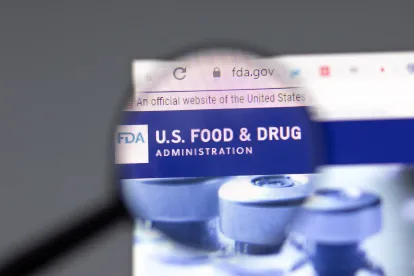Whether a consumer is taking calcium carbonate for strong bones, magnesium to fall asleep, or high-dose caffeine to stay awake, the U.S. Food and Drug Administration (FDA) does not approve dietary supplements for safety and effectiveness. So how do consumers know if a product is safe, and how can manufacturers protect themselves in the case of a problem?
In response to stakeholder feedback, the FDA on February 21, 2024, released its updated directory of FDA actions and communications with respect to “Information on Select Dietary Supplement Ingredients and Other Substances.” The original directory, known as the Dietary Supplement Ingredient Directory, was launched in March 2023 “to help manufacturers, retailers, and consumers stay informed about ingredients that may be found in products marketed as dietary supplements and quickly locate information about such ingredients on the FDA website.” The directory replaced FDA’s “Dietary Ingredient Advisory List,” first published in April 2019.
Along with a new name, the updated directory includes numbered categories to classify the type of FDA action or communication for each listed ingredient and the date each ingredient was added, as the agency noted February 21. Seven categories help to indicate, for example, whether an ingredient has been the subject of an authorized or qualified health claim; the topic of a safety communication (such as biotin’s interference with lab tests); or whether it meets various standards and definitions in the federal Food, Drug, and Cosmetic Act (FD&C Act).
The 2024 directory now contains 79 entries (the 2023 version had just 27, which we named in a previous blog post). Still, the FDA cautions that the directory is not intended to be a comprehensive list of all ingredients used in dietary supplements and may not include all actions the agency has taken with respect to a particular ingredient. As some of the authors have noted in prior articles, one of the issues with various FDA ingredient lists is the lack of transparency as to how the agency decides whether or not to add or remove an ingredient from the list in question. (See FDA’s Ingredient Advisory List Raises Due Process Concerns, Natural Products Insider (Nov. 29, 2021).)
As we indicated upon the release of the prior Dietary Supplement Ingredient Directory in March 2023, manufacturers, retailers, and companies marketing dietary supplements should assess whether any of their current or anticipated products contain ingredients listed in the directory, and, if so, determine the impact of any FDA-issued guidance concerning such ingredients.
Guidance: New Drugs, Qualified Health Claims, Toxic Caffeine and More
The 2024 directory reminds consumers and manufacturers that even a substance as seemingly harmless as aspirin (a new listing) could trigger an FDA warning letter if, for example, the label claims that an added 300 mg of elemental calcium carbonate could help to prevent osteoporosis—and features an image of a glass of milk to bolster those claims.
A 2008 FDA letter to an aspirin manufacturer pointed out that aspirin is a drug regulated under section 201(g)(1)(B) of the FD&C Act. While calcium carbonate is sold as a dietary supplement alone, its presence in a combination drug-dietary supplement product, combined with the health claims, allegedly rendered the product a (misbranded) new drug under the Act that had not been recognized as safe and effective for its intended use. The agency required that the manufacturer take steps to correct the problems within 15 days (or state the reason for the delay), suggesting further legal action.
In another entry, the FDA stated in a letter dated January 2022 that it did not object to the use of health claims linking magnesium, another new listing, to reduced hypertension—after determining that the totality of the scientific evidence supports a Qualified Health Claim (QHC) on the relationship in conventional foods and dietary supplements. QHCs are those supported by scientific evidence, but do not rise to the level of an authorized health claim; thus, QHCs must be accompanied by a disclaimer or other accurate language to avoid misleading consumers.
Pure and Highly Concentrated Caffeine products, meanwhile, may still trigger an FDA action, as the substance remains on the list. As the agency points out, the difference between a safe or a toxic amount of highly concentrated caffeine is small, and difficult to measure accurately, since a teaspoon of these products can contain as much caffeine as 28 cups of coffee.
“The FDA aggressively monitors the marketplace for dangerous products, including dietary supplements consisting of pure and highly concentrated caffeine, and will take action as appropriate,” the agency warns. “If violations exist, the FDA can pursue enforcement action, such as seizure of the product or an injunction to prevent the firm from continuing to manufacture or monitor the product.”
Practical Implications
The FDA’s Dietary Supplement Ingredients lists have not yet gone through formal rulemaking procedures, including public review and comment prior to promulgation. Thus, they are, at best, “guidance documents” whose legal authority and weight are subject to debate. Nevertheless, manufacturers and retailers should proceed cautiously when marketing products that contain these ingredients, which are, no doubt, already on the FDA’s radar.
Manufacturers, consumers, or other interested parties are invited to submit additional feedback and information regarding the directory to the FDA’s Office of Dietary Supplement Programs, at ODSP@fda.hhs.gov.
Epstein Becker Green Staff Attorney Ann W. Parks contributed to the preparation of this post.





 />i
/>i
